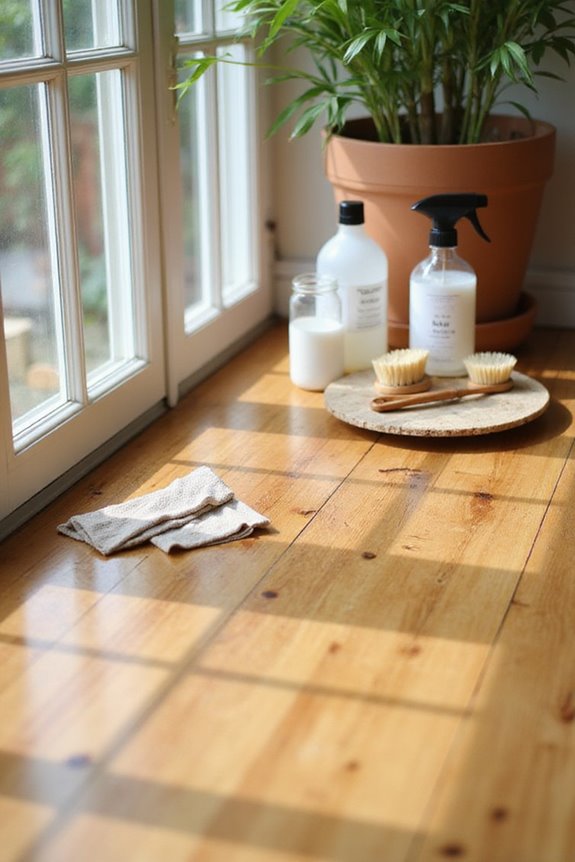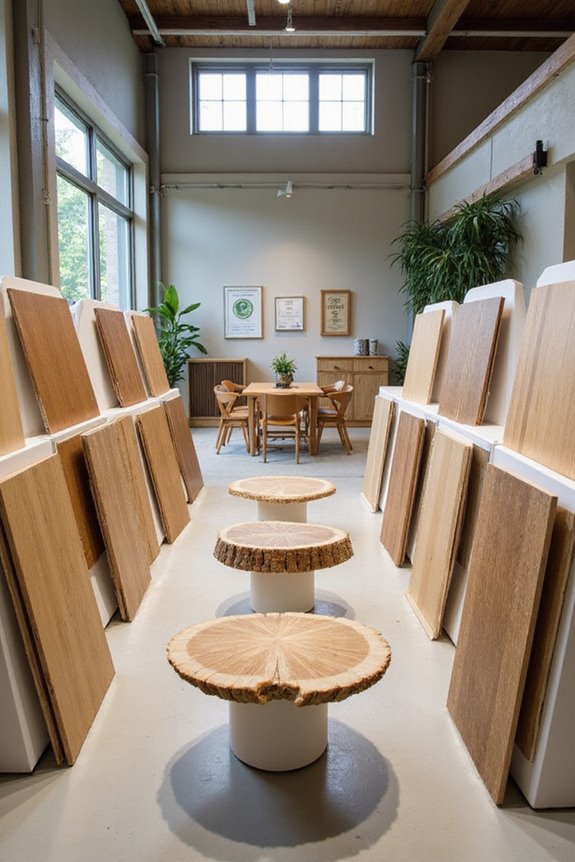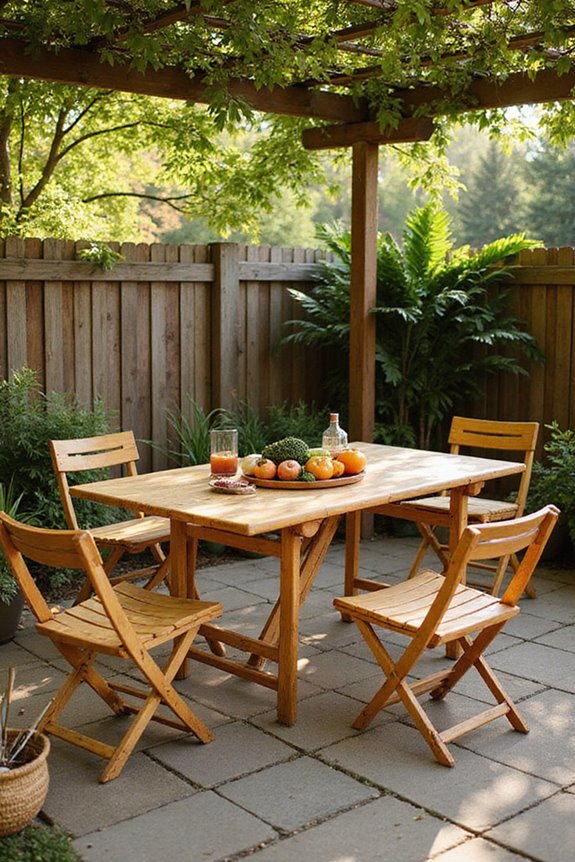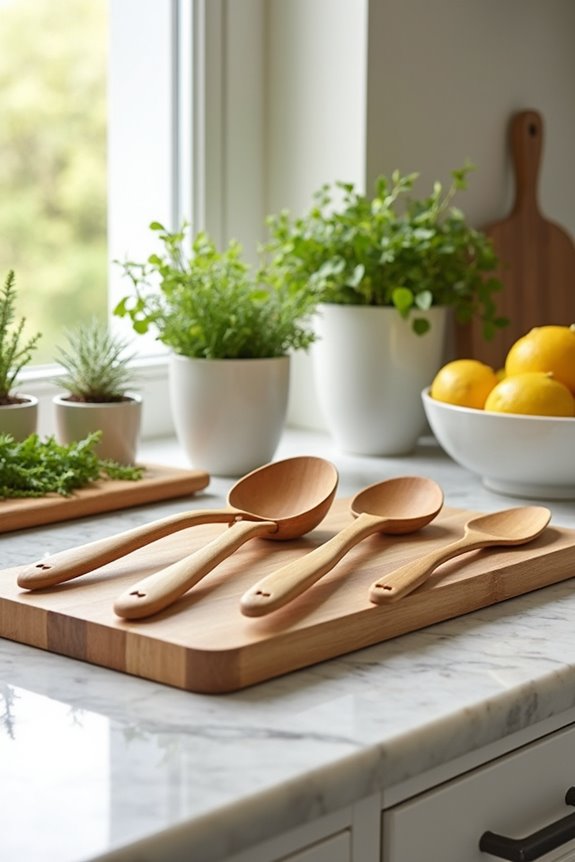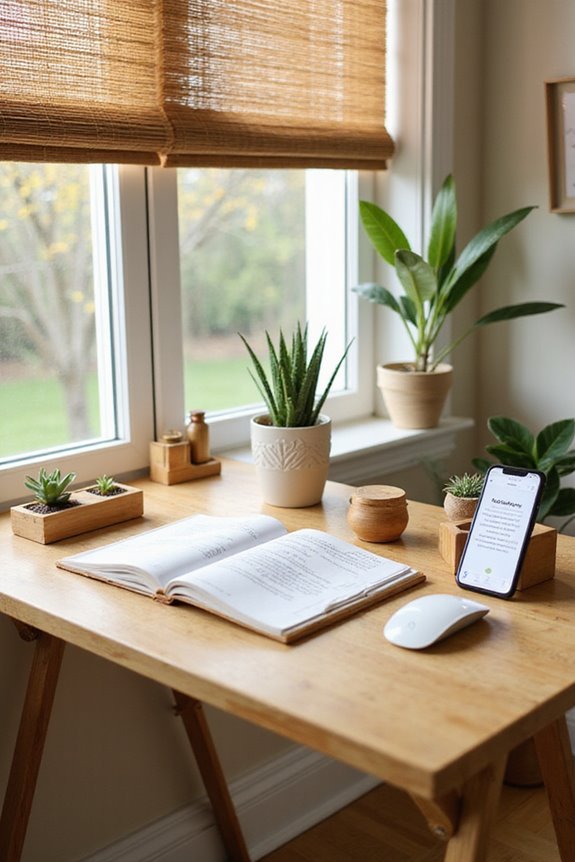To remove stains from bamboo, we can use natural cleaning agents like baking soda, lemon juice, and hydrogen peroxide. For food stains, a paste of baking soda and water works well. If we encounter grease stains, regular dish soap helps. Gently blotting stains prevents deep penetration, while rinsing thoroughly removes residue. Avoid harsh chemicals to protect bamboo. These methods keep our bamboo products looking great. Next, we’ll explore practical tips for maintaining bamboo longevity.
Key Takeaways
- Use a paste of baking soda and water to treat food and beverage stains on bamboo surfaces.
- Apply hydrogen peroxide directly to tough discolorations for effective stain removal.
- For grease stains, use liquid dish soap applied directly to the affected area.
- Pre-soak bamboo items in warm water with mild detergent to loosen oils before washing.
- Regularly condition bamboo with food-grade mineral oil to maintain its appearance and longevity.
Understanding Bamboo Stains
When we talk about bamboo stains, we should recognize that various factors contribute to their formation. The primary stain causes include lichens, environmental conditions, and the aging process. For example, bamboo exposed to high humidity may develop dark spots from lichen growth. Sunlight and temperature fluctuations can also trigger discoloration, affecting the overall aesthetic impact of bamboo products.
Stains can appear as greyish-white or dark spots, but they don’t compromise the bamboo’s structural integrity. Curiously, some stains are even marketed as unique features, like the distinctive patterns of “Tiger Guadua.” Understanding these elements helps us appreciate bamboo’s beauty and guides us in choosing the right products for our needs.
Natural Cleaning Agents for Effective Stain Removal
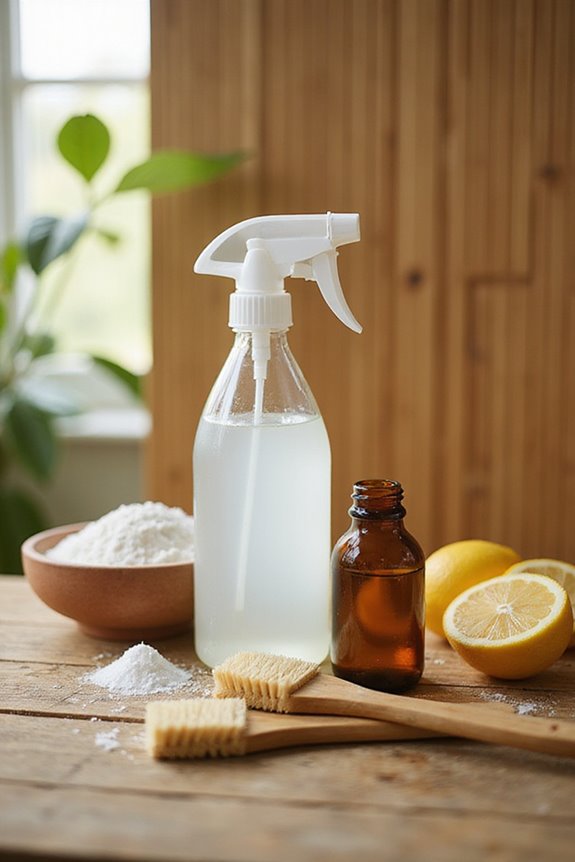
Removing stains from bamboo can be straightforward, especially when using natural cleaning agents. Here are some effective options:
- Citrus Solutions: Lemon juice serves as a natural bleaching agent. Mixing it with baking soda creates a paste that lifts stubborn stains.
- Vinegar and Water: Equal parts vinegar and water make a gentle spray. This solution is great for lightening and freshening bamboo surfaces.
- Hydrogen Peroxide: This natural bleach disinfects and removes stains effectively.
- Baking Soda Paste: Mixing baking soda with water forms a paste that’s safe for delicate fibers.
- Enzymatic Cleaners: These cleaners utilize enzyme effectiveness to break down organic stains.
Using these natural cleaning agents, we can keep our bamboo looking its best. Regular maintenance helps preserve the bamboo’s appearance and functionality, including ideal humidity levels that prevent issues with expansion or contraction.
Application Methods for Different Stain Types
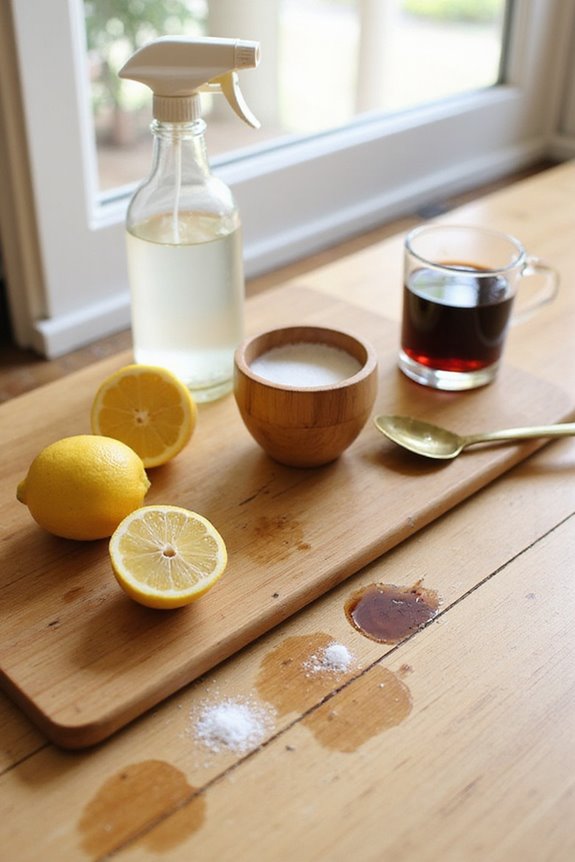
Addressing different types of stains on bamboo requires specific application methods to achieve the best results. For food stain removal, we can create a paste with baking soda and water to lift stubborn marks. Alternatively, dabbing hydrogen peroxide can tackle tough discolorations. For grease stains, grease stain techniques like applying liquid dish soap directly onto the stain work effectively. We should avoid hot water initially, as it can set the stain. Instead, pre-soaking in warm water with a mild detergent helps loosen oils. After treating stains, it’s essential to launder promptly in cool or warm water to fully remove residual stains and soap, ensuring our bamboo fabrics remain fresh and clean.
Specific Treatments for Common Stains
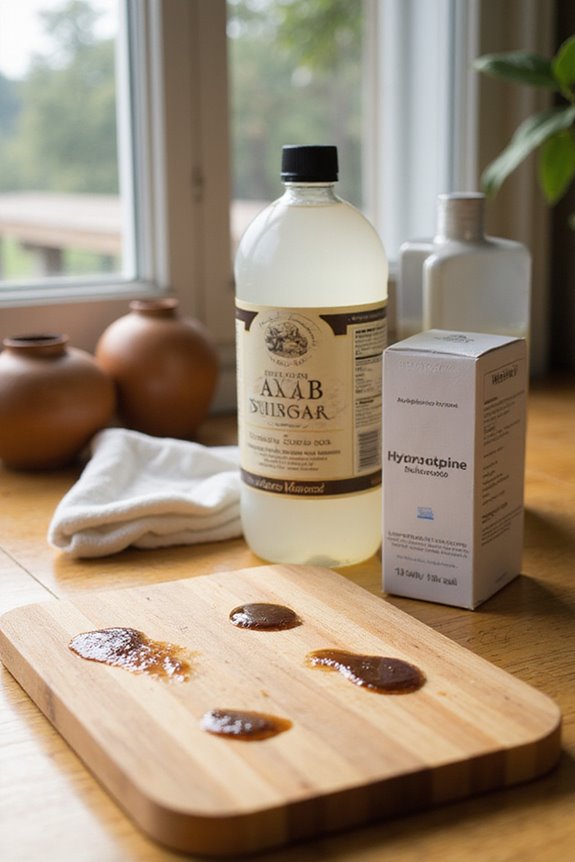
Specific treatments for common stains can make a significant difference in keeping bamboo looking its best. For food and beverage stains, a lemon juice and baking soda paste works wonders. We can apply it, let it sit, and gently scrub. For oil and grease, dish soap is our go-to; we just apply it directly and rinse. Biological stains, like blood, respond well to hydrogen peroxide, but we should test it first.
For dye and chemical stains, non-chlorine bleach is safer for bamboo. Remember to blot stains promptly to prevent deep penetration. Using these stain removal treatment techniques consistently guarantees our bamboo stays clean and vibrant. Regular maintenance and quick action are key to effective stain removal, and utilizing eco-friendly properties of bamboo can enhance the longevity of your furniture.
Avoiding Damage During Cleaning
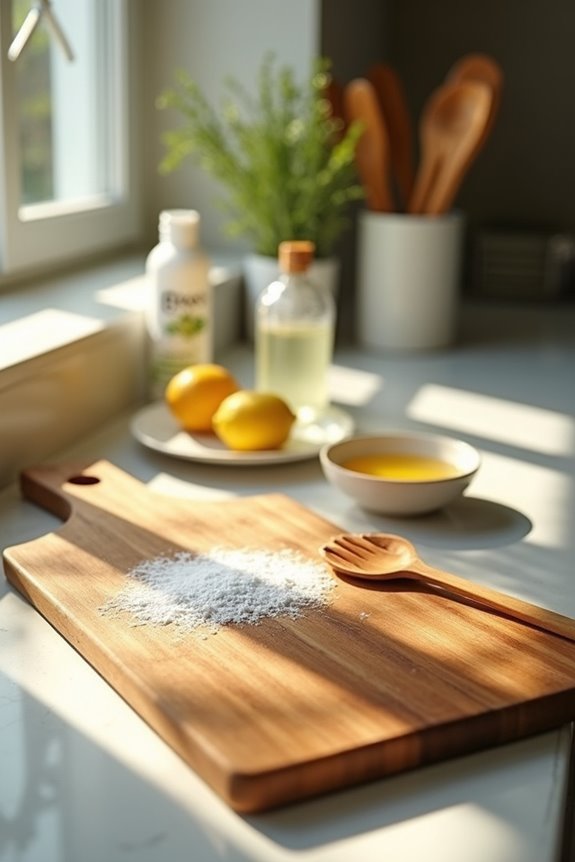
Keeping our bamboo items clean is important, but we need to be careful during the cleaning process to avoid any damage. Here are some key tips for effective bamboo care:
- Limit Water Exposure: Never soak bamboo items. Instead, use quick rinses and mist cloths to prevent moisture from seeping in.
- Gentle Cleaning Agents: Opt for mild or organic soaps. Avoid bleach and strong detergents that can harm bamboo’s finish.
- Handle with Care: Store bamboo upright and avoid heavy impacts. Check for cracks regularly to guarantee safety.
- Moisture Balance: Condition bamboo with food-grade mineral oil to keep it supple. Regular oiling may be required for longevity of bamboo products to ensure they remain in good condition.
Eco-Friendly Benefits of Natural Cleaners
When we think about cleaning our homes, choosing eco-friendly products can have significant benefits for both our health and the environment. By opting for cleaners with natural ingredients, we embrace eco-friendly advantages that support our well-being and sustainability goals.
- Healthier Homes: Natural cleaners are non-toxic, reducing allergies and respiratory issues. They’re safe for children and pets, making our spaces healthier.
- Environmental Protection: Eco-friendly products break down naturally, avoiding harm to ecosystems. They help reduce plastic pollution with recyclable packaging.
- Cleaner Air Quality: These cleaners emit fewer volatile organic compounds (VOCs), improving indoor air quality and lowering health risks. Additionally, using natural cleaners aligns with the benefits of eco-friendly bamboo towels, enhancing overall environmental sustainability.
Practical Tips for Maintaining Bamboo Products
Maintaining bamboo products is essential for enhancing their longevity and appearance. Here are some effective bamboo maintenance techniques to take into account:
- Regular Cleaning: Use a soft, damp cloth for dusting. For stains, apply mild soap mixed with water, and avoid harsh scrubbing.
- Oiling and Conditioning: Apply natural wood polish or mineral oil periodically to keep surfaces lustrous. For cutting boards, use food-safe oils to prevent drying.
- Proper Storage: Always dry bamboo products before storing them. Keep them in a cool, dry place away from direct sunlight.
- Inspect Regularly: Check for damage and restore finishes as needed. Regularly assess the board’s condition and maintenance to ensure it remains in optimal shape.
Preventing Future Stains on Bamboo
How can we effectively prevent stains on our bamboo products? Stain prevention starts with proper care and maintenance. For bamboo clothing, we should wash them in cold water and avoid harsh chemicals. Regular cleaning can stop body oils from setting into the fabric.
When it comes to bamboo sheets, let’s identify stains early and use eco-friendly solutions for treatment. Washing them separately helps prevent damage as well. For bamboo boards, using cutting mats can keep stains at bay, while also ensuring they dry thoroughly after cleaning. Additionally, utilizing eco-friendly materials ensures that our bamboo products remain in good condition while promoting sustainable practices.
Lastly, regular inspections and maintenance of bamboo fencing can help us catch any issues before they worsen. Together, these practices will enhance our bamboo maintenance and keep our items looking their best.
The Importance of Gentle Handling
Gentle handling is essential for preserving the integrity of bamboo products. When we wash bamboo fabrics, opting for gentle washing cycles with cold water helps maintain fiber quality and prevents shrinkage. Using mild, eco-friendly detergents is vital, as harsh chemicals can damage the fibers.
To protect color vibrancy, turning bamboo garments inside out before washing is a smart choice. We should also zip and snap fasteners to avoid snags during the wash. Pre-treating stains with natural solutions, like baking soda, minimizes the need for vigorous scrubbing, which can weaken fibers. Remember, by practicing gentle washing techniques, we contribute to fabric preservation, ensuring our bamboo items remain soft and durable for years to come.
Regular Care for Longevity of Bamboo Fabrics and Surfaces
Taking good care of bamboo fabrics and surfaces helps them last longer and stay in great shape. For effective bamboo maintenance, we should wash fabrics in cold or lukewarm water to protect their fibers and colors. Avoid bleach and fabric softeners because they can damage bamboo.
When cleaning surfaces like cutting boards, we must use mild soap and warm water immediately after use. It’s best to dry them thoroughly to prevent warping or cracking.
To enhance fabric longevity, we should store bamboo items in cool, dry places and avoid direct sunlight. Regularly applying a bamboo-specific conditioner can also keep surfaces in top condition. By following these tips, we guarantee our bamboo products remain vibrant and functional.
Frequently Asked Questions
Can I Use Commercial Cleaners on Bamboo Surfaces?
Absolutely, we can use certain commercial cleaner types for bamboo surface care! Let’s choose pH-balanced, eco-friendly options that protect our bamboo’s natural beauty while ensuring it stays clean and vibrant for years to come.
How Often Should I Clean Bamboo Items?
When it comes to bamboo maintenance frequency, we should clean our bamboo items weekly using gentle cleaning methods. Daily dusting helps, but regular care keeps our bamboo looking beautiful and lasting longer together!
Is It Safe to Machine Wash Bamboo Fabrics?
Absolutely, we can machine wash bamboo fabrics! By using gentle cycles and cold water, we’ll protect the fibers while ensuring our garments stay soft and fresh. Let’s keep our bamboo looking great together!
Can Sunlight Damage Bamboo Products Over Time?
Absolutely, we’ve noticed that sun exposure can markedly affect bamboo longevity. Over time, UV rays cause fading and surface damage, so it’s wise to protect our bamboo items with coatings and avoid direct sunlight when possible.
What Should I Do if Stains Persist After Treatment?
When faced with persistent stains, we must embrace the art of patience. Let’s reapply our stain removal techniques, extend treatments, and remember, sometimes seeking expert guidance can illuminate our path to success.

